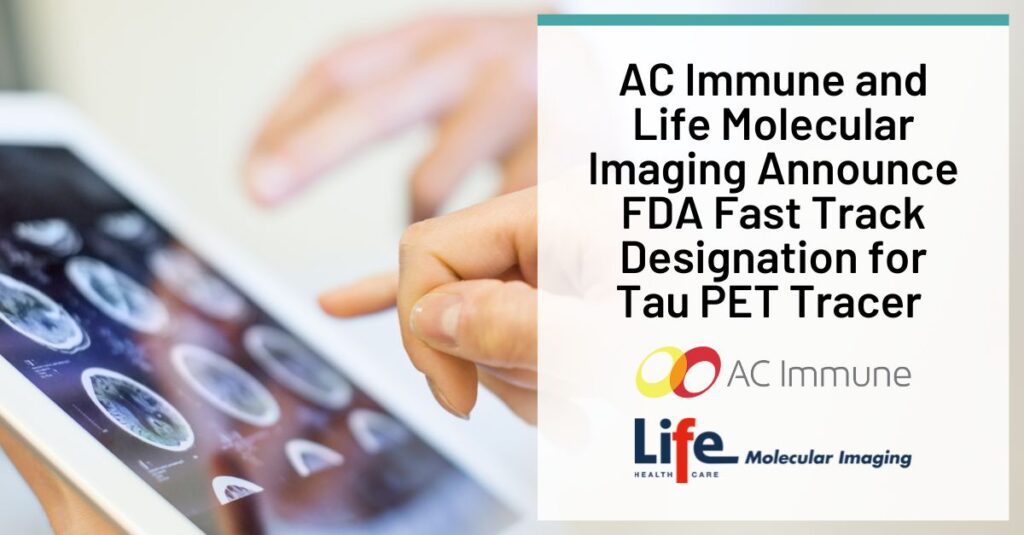AC Immune and Life Molecular Imaging Announce FDA Fast Track Designation for Tau PET Tracer

Swiss biopharmaceutical company AC Immune announced in late August that its partner, German biopharmaceutical company Life Molecular Imaging (LMI), received a Fast Track Designation from the US Food and Drug Administration (FDA) for a Tau PET tracer.
PET, or positron emission tomography, is a form of medical imaging that uses a radioactive tracer to visualize and measure changes in various metabolic processes. The PET tracer [18F]PI-2620 was engineered by researchers to bind to a form of the Tau protein that are associated with some forms of FTD as well as Alzheimer’s disease. By making this form of Tau visible to a PET scanner, the tracer allows research and medical professionals to measure and track the distribution of the proteins.
By entering PI-2620 into the Fast Track program, the FDA will assist AC Immune and LMI to accelerate the development of the tracer to address the unmet needs of people affected by progressive supranuclear palsy (PSP), corticobasal syndrome (CBS), and other tauopathies like Alzheimer’s.
“Fast Track designation for PI-2620 is an important reflection of its potential to accurately diagnose Alzheimer’s and other neurodegenerative diseases,” said AC Immune CEO Andrea Pfeifer, PhD. “Early diagnosis of these conditions will be key for effective treatment before irreversible damage occurs and is an essential element in our goal of achieving precision prevention. The FDA has previously granted Fast Track status to two of our active immunotherapies in Phase 2 development, ACI-35.030 and ACI-24.060, which target phospho-Tau and Abeta, respectively.”
is currently undergoing Phase 3 & 1 clinical studies in Alzheimer’s disease and orphan diseases like PSP and CBS that lack treatments specifically for them.
Studies on [18F]PI-2620 Show Promise
Previous research on PI-2620 shows has indicated that the tracer has the potential to differentiate suspected diagnoses of PSP. A study from 2020 showed that not only was the tracer successful in binding to Tau associated with PSP, but it was also “blockable,” meaning the tracer does not bind to the wrong proteins, potentially creating a false positive.
To obtain this data, scientists at multiple research centers recruited 60 people with PSP to undergo a PET scan with PI-2620. For comparison, the scientists also recruited 10 people with Alzheimer’s disease, 10 with multiple system atrophy (MSA), and 10 people without a neurodegenerative condition to serve as a control group. After completing imaging for the PSP participants, the researchers found a significant amount of PI-2620 in regions of participants’ brains commonly affected by PSP.
Scientists noted the tracer was also able to differentiate between cases of PSP Richardson’s syndrome (PSP-RS, the most common form of the disorder) and those that were not. People with PSP-RS showed more tracer binding in certain areas of the brain. Other forms of PSP (such as PSP with predominant parkinsonism) showed different patterns of tracer binding. Tracer binding in areas of the prefrontal cortex also differentiated between cases of PSP and Alzheimer’s disease.
Researchers commonly grade medical tests and diagnostic tools based on two factors:
- Sensitivity: The capability of a test or diagnostic tool to correctly identify individuals with a condition without providing a false negative.
- Specificity: The capability of a test or diagnostic tool to correctly identify individuals who do not have a condition without providing a false positive.
PI-2620 performed well in terms of sensitivity and specificity for PSP, with researchers noting a sensitivity of 85% for PSP-RS and 65% for non-RS PSP, and an overall specificity of 77%. In breaking down the results of their analysis, scientists noted:
- 34 of 40 people with PSP-RS tested positive
- 12 of 20 people with non-RS PSP tested positive
- 1 of 10 people with MSA tested false-positive
- 6 of 10 people with Alzheimer’s tested false-positive
Researchers at firms like AC Immune and Life Molecular Imaging are increasingly working with government entities like the FDA and the National Institutes of Health to address the unmet needs of people living with FTD. Transposon Therapeutics received a Fast Track designation from the FDA earlier this year for a treatment for PSP, while Aprinoia Therapeutics received a Fast Track for its own PET tracer.
Are you interested in participating in clinical trials for FTD? Join the FTD Disorders Registry to not only keep up to date on the latest research opportunities, but to share your lived experiences to guide researchers.
By Category
Our Newsletters
Stay Informed
Sign up now and stay on top of the latest with our newsletter, event alerts, and more…
